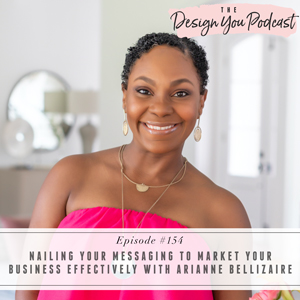
Are you a creative or designer who is struggling to articulate your value to get the clients you want at the price you want to charge? If so, this is your episode! Today’s guest joins me to help you establish who you are, what you do, and how to communicate this with your clients.
Arianne Bellizaire is a Baton Rouge-based Interior Designer specializing in residential reconstruction and renovation projects. She brings the topic of interior design to life and combines the skills and knowledge from her communications degree with her real-world experience as a business owner to help people get to where they want to be. She’s here today to show you how to get clear on your messaging and market your business effectively.
Join us this week as we discuss the benefits of having an abundance mindset and learning to trust yourself in your business. We discuss the importance of staying true to your values, and how to be courageous enough to listen to your intuition, show up authentically and best serve your ideal client. Get ready to think differently, friends, this episode is a good one!
If you want help creating a business with thriving revenue streams so that you can design the life you really want this year, now is your chance! We’re going to be opening the doors to the Design You Coaching Program really soon, get on our waitlist now!





